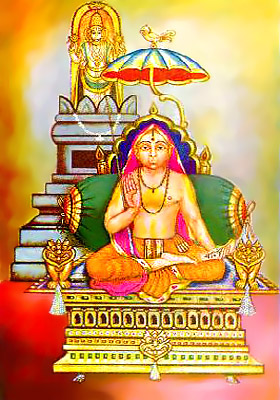 Vyasatirtha (1460-1539) was also known as Vyasaraja or Vyasaraya or Vyasraja swamin. He propounded the Dvaita Vedanta theory. He organized Dvaita philosophy into an established school of Vedic thought. He could debate well as well as and dialogue in logic and philosophy.
Vyasatirtha (1460-1539) was also known as Vyasaraja or Vyasaraya or Vyasraja swamin. He propounded the Dvaita Vedanta theory. He organized Dvaita philosophy into an established school of Vedic thought. He could debate well as well as and dialogue in logic and philosophy.
Early Life of Vyasatirtha
He was born in Bannur in about 1460 AD in the Mysore District. He was one of the leading dialecticians in Indian philosophy. After he was renamed Vyasatirtha he was obliged soon after his succession to the head of the matha to go to Kanchi that was the centre of the Vedic studies in South India. It was probably here that he acquired his learning in the systems of Sankara, Ramanuja, Bhatta and others. He went over to the seat of Shripadaraja at Mulbhagal after the completion of his studies at Kanchi. He spent many years in meditation.
Contributions of Vyasatirtha
His work was to write detailed commentaries on the works of Srimad Ananda Tirtha and Sri Jayatirtha. Through these works he showed the logic side of Tattvavaada. In the Vijayanagar Empire he was influential. He came to limelight in the court of Saluva Narasimha in Chandragiri where through his debates he defeated many scholars. During 1486-1498 CE he also headed the Tirupati Temple. During the time of Krishnadeva Raya he was the most influential. Vyasatirtha passed away at Vijayanagara on the fourth day of the dark fortnight of Phalguna, in Vilambi on 8th March 1539 AD. He was was a thinker of high order. He never misused his influence with Kings to make his faith the religion of the state.
Vyasatirtha was a composer of sacred songs in Kannada thereby contributing to Dasa-saahitya. He will be remembered as he gave India, Purandara Dasa, the father of Carnatic music and Kanakadasa, disciples of Vyasaraya.
Works of Vyasatirtha
He is known for his lucid writings. His famous compositions include Nyayamritam (The nectar of Logic). Here he has justified the philosophical power of the realistic metaphysics of Madhvacharya. He through his arguments shows that there is no philosophical justification for rejecting the reality of the world and its experiences established by all known means of knowledge.
In Tarkatandava (The Dance of Logic) he has undertaken thorough and up to date examination of his school as well as the philosophy of Nyaya-Vaishesika. Tatparya Chandrika (The Moonbeams of commentary) is a discursive commentary on Jayatirtha`s Tatva-prkakashika and is limited to the Sutra Prasthana of the Dvaita Vedanta. His other works include Mayavada Khandana Mandaramanjari, Upadhi Khandana Mandaramanjari, Prapancha Mithyatvanumana Khandana Mandaramanjari, Tattvaviveka Mandaramanjari and Bhedojjivana. Bhedojjivana is a small composition in 275 grantha`s and is intended to revive Bheda. Sattarkavilasa is also another book authored by him.









